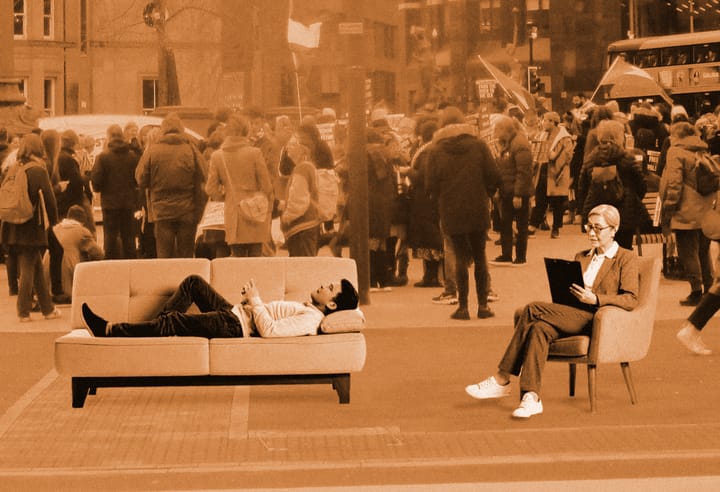Inside the Mind of the Professional-Managerial Class, Part One
Boundaries are the latest therapeutic propaganda.

The following clinical material is fictional, based on composite experience.
My young affluent patients in the San Francisco Bay Area want help setting boundaries. These are not your co-dependent, addicted, borderline clients, with whom work on boundaries is a venerable therapeutic standard. Instead, picture a 32-year-old Ivy League grad with an intact family, a loving romantic relationship, and lots of friends. And a six-pack. And a heavily anthropomorphized dog. And a job they… love?
It’s primarily at work they want to set boundaries: their jobs—predominantly in tech, though also marketing, sales, and so on—demand intensive hours, and don’t stop off the clock. Emails arrive through the night. Perks like free food, booze, and gyms function like a tether. The pressure is incessant. One patient recently described her life as a “giant low-grade panic attack,” another as “an interminable interview.” Even amidst the current COVID crisis, the pace of work for these patients hasn’t let up—indeed for many, the workload has intensified as companies attempt to capitalize on our even more digitally-mediated lives.
Pre-COVID, setting boundaries socially also proved challenging: co-worker hang-outs, weddings in distant places, baby showers, family obligations, date nights, the omnipresence of social media. Weekends are scheduled many months out; often so are weeknights. To help manage and maintain the superhuman pace, these clients routinely turn to caffeine and alcohol—another place they want help setting boundaries.
Commonly, these patients have been trying, and failing, to set boundaries on their own for years. The firm, meaningful barriers they attempt to erect don’t hold, or simply aren’t enough. They feel anxious and overwhelmed. They decide to try therapy.
One patient in her late thirties, for example, had tried moving roles, moving companies, keeping one weekend free each month, not responding to emails between 9pm and 8am, deleting social media apps, leaving work by 6pm, and eliminating booze on weeknights. She’d hired a personal trainer for morning workouts and held endless conversations with bosses. Frustrated and overwhelmed, she made an appointment with me. She lamented that no matter what she did, she could not seem to “find balance.”
I observed that since she seemed to have tried every sane thing, perhaps setting boundaries was not possible in her current workplace and social culture—or, not really the issue altogether.
Setting boundaries for the professional-managerial class does seem essentially futile. The basic business model structuring their lives depends on the obliteration of boundaries. It demands excess labor, insidiously instilling a neo-workaholism through its Hack Your Life ethos. Perpetual availability is expected, not because your contract says so, but because you love your job That Much. Modern corporate culture insists on enthusiasm: cheerfulness, extroversion, and boundless energy are required. Socializing with coworkers is obligatory. And radical intrusiveness is the norm. Privacy, boundaries, even subjectivity itself are under attack in the project of extracting current and future value from one’s every motion, relationship, and thought. There isn’t really anywhere to hide.
On the one hand, boundaries are simply part of a broader “self-care” paradigm that places social problems on individual shoulders. “Self-care,” including boundaries, is taken on by workers as yet another task to be productively tackled, in a doomed effort to escape neoliberal suffering via its own logic.
On the other hand, however, boundary-setting is a distinctive phenomenon, and one that makes particular Freudian sense in our contemporary moment. Freud believed we develop as subjects through the construction of distinct, bounded selves. Beginning with the recognition of separateness from primary caregivers, the Freudian subject hones a sturdy, deep, self-reflective interior from which to engage reality as an autonomous agent. The present moment eviscerates meaningful distinctions between self and other, public and private. Work emails invade evenings with families, while social media apps are constantly refreshed at work. Today’s totalitarian digital capitalism has shaped a diffuse, hollow subject pliantly available for its projects and operates outside the “boundaries” of awareness.
Even if my patients were able to erect the sorts of superficial boundaries they claim to want, they would only function as a band-aid—much like the Xanax, psilocybin, and mindfulness they also want—over a gaping wound. What my patients are longing for, really, is not just more free time (which they would probably spend miserably), or freedom from the incessant imposition of emails (which they would actually feel empty without), but rather the possibility of constructing an ego that is more than just a stimulus-reflex arc. An ego that knows itself, knows what it wants, and can pursue it—precisely the sort of ego the degrading pressures of Silicon Valley style digital capitalism work against in the effort to render human experience as a predictable, lucrative commodity. Absent this sort of self, when my patients do get a break (during the current coronavirus lockdown, for example), they hardly know what to do with themselves. They scroll aimlessly through Twitter, videogame for hours, and worry about gaining weight.
If individual talk therapy can’t solve immiserating socioeconomic problems, it can at least elucidate the situation. As a therapist, I try to reject the propaganda of boundaries and make clear what patients are up against: not a personal problem with “boundaries,” but an instrumentalizing capitalist culture reducing their subjectivity to behavioral data. I can offer a space and relationship in which to develop their critical subjectivity, can encourage them to organize at work (formally or informally), and consider making substantive life changes.
The woman in her late thirties referenced earlier, after eventually accepting how much she detested her job, began exploring who she was outside of work, and wondering how that person might actually like to spend her life. She discovered that she loved history, for example, and nature. Ultimately, she left San Francisco and moved to a rural community, where she works in agritourism.
“The dreams have no dream.” But of course, we should all be so lucky.
■
Lizzie Warren, PsyD, meanwhile, remains in SF, locking herself in to lose herself in Facebook.



